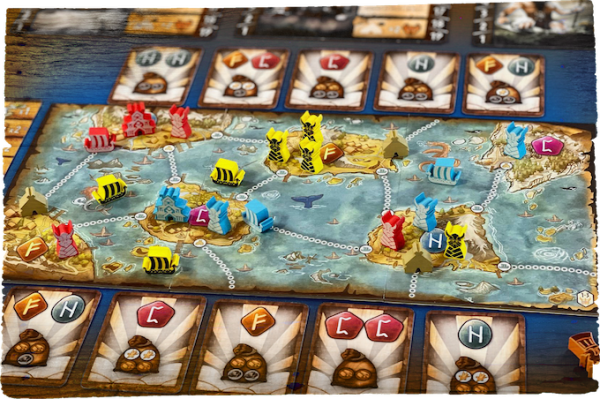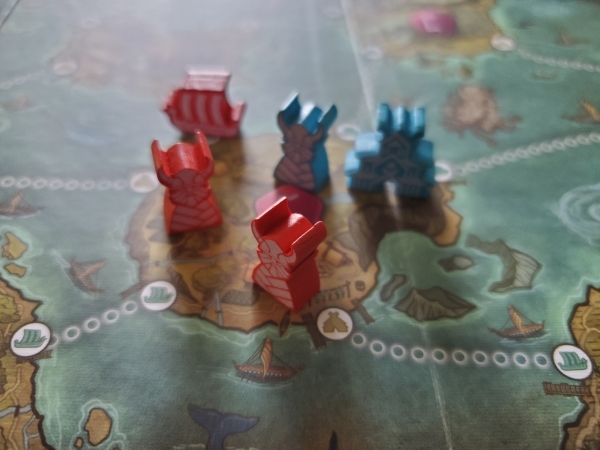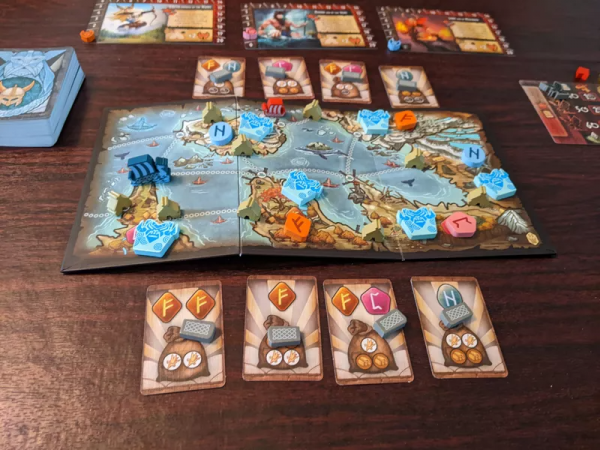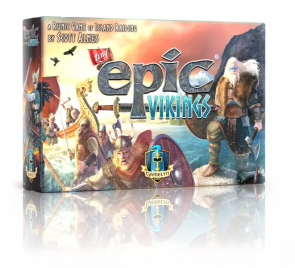In a case of function over form, TEV suffers from a lack of theme.
I'm a Tiny Epic fan, as any casual review of my work here at TWBG will reveal. I own everything ever produced under the Tiny Epic label by Gamelyn Games and am always fascinated by how much game they manage to cram into one of their small boxes. Two games ago, I questioned whether Tiny Epic Pirates had finally become the game in the series that could plausibly be accused of being "just a smaller version" of another game; in this case, Merchants & Marauders. That label is often tossed at TE games and is almost invariably wrong, since all of them tend to stand on their own two feet/treads/claws in terms of both mechanisms and overall approach. You could argue that TE Dinosaurs is a smaller version of Dinosaur Island and you'd be wrong, since the two games play quite differently. Pirates, OTOH, despite an interesting use of a rondel for actions throughout the game, is basically M&M, albeit absent the vast majority of the chrome that said bigger game provides. Tiny Epic Vikings can also be argued to be a smaller version of Blood Rage, since both use card drafting and area control in a Norse theme. But, once again, where Blood Rage suffuses all of its interesting mechanisms with theme and glittering chrome, TEV simply doesn't and it may be to its detriment.

There are three rounds or Eras, which each begin with a card draft. In TEV, you're drafting generational leaders who will provide you with Leader actions, possible extra Runic actions, and grant you a rune for this round that you can use to initiate more Runic actions with later plays. Or you can place your card face down and use it to fight a battle for a divine Favor card that will provide immediate resources, but then disappear until the end of the game where it will be used for final scoring. In the process of playing your leaders, you'll also be moving ships around the board, depositing settlers, claiming runes, and raiding villages for even more extra actions on any given turn. What you're trying to do is establish the most Influence on any particular island in order to claim its rune, which will be used to activate runic abilities as with the leaders, but will also be used in endgame scoring like the Favor cards. In the course of all this action- taking runes, fighting (and losing) battles -you'll raise three gods' Fury levels that are tied to their respective runes and directly contribute to that endgame scoring again, while occasionally taking advantage of the Valhalla Boons you receive from them for losing a battle.

Those godly Boons are the only variable factor between players and are, of course, usable by any of the players depending on which leader they use that ends up going to Valhalla when they lose a fight. That makes TEV highly unusual in the series in that everything you do differently from your opponents is both temporary and entirely dependent on the cards you draft, in the same way that what you can do differently in Tiny Epic Galaxies is dependent on which worlds you claim in the course of play and in Pirates based on which crew you recruit; both of which are entirely mechanical and not subject to any sort of flavor or thematics. In every other game of the series, you either begin with different abilities than your opponents (Western, Kingdoms, Dungeons, Zombies, Mechs, Tactics, Defenders) or are able to gain different abilities by actions in the game (Quest, Dinosaurs), all of which endure from turn to turn and round to round and are suffused with the theme of the game, from magic items to blasters to the difference between a Rancher and a Gambler. There is nothing that differentiates any one player from another in TEV other than which cards they're able to draft that focus on one of the three rune types and, thus, one of the three gods and its Fury level.

Now, there's nothing wrong with that. Most games that are considered "Euros" (for whatever value that term still holds) don't have what BGG defines as "variable player powers." Many of them are still brilliant games. In TEV, with everyone playing strictly on the same level and only smart drafting, cagey movement of ships and settlers, and smart planning of both the short-term (resources) and long-term (victory points and Fury) pointing the way to victory, it's still an interesting contest. But it leaves one with the impression that TEV could have used any theme and any setting and still been the same game. Why wasn't it a game about viruses flowing through a giant body, infesting various cells, fighting with other viruses or immune responses, and gaining some immunity (biological Boons) for not being wiped out? It's not a perfect analogy, but the only thing that Gamelyn invited by using the viking theme is a comparison to Blood Rage, against which TEV kind of suffers because all of the myths built up around and through the Norse culture are so prevalent in that larger game and almost utterly absent in this one. The only sign of them is the different Boons from the three gods used in each session and which require you to lose a battle in order to exercise them.
That's not to say that TEV is a bad game. It isn't. The long- and short-term planning required is reminiscent of what may be the best game of the series in Tiny Epic Western. I've won my last two games by raiding villages in order to Dedicate them in the third era on whichever god seems most advantageous to me to have a higher Fury rating. But I've also won by securing a position on one side of the board that is borderline inaccessible to my opponents (or at least not worth the risk of engaging; see: The Twilight Imperium conundrum) and makes me more interested in collecting those villages to manipulate the VP tree, rather than expanding my little empire or dropping my monsters onto Yggdrasil and creating new legends of my own (as could be the case in Blood Rage.) It's a case of the mechanisms superseding theme in every way and there being no flavor (abilities, special cards, die rolls) that invites the idea of vikings sailing the North Sea to contest the land with other peoples or creatures of myth, even in the worker placementy method of something like Champions of Midgard. Even the Shamans mini-expansion doesn't do anything strikingly different from what's already present. In that respect, I would suggest including at least the Shaman cards into the game automatically because they not only provide double runes, but also give the ability to raise Fury levels outside the usual methods. Again, they're not about changing or adding anything different to the game. They're just about adding more, which means that anyone just learning should be able to adapt to them as easily as anything else.

On that learning aspect, this rulebook was something of an outlier to most in the series. While there have been exceptions like Dungeons, which basically invented a whole new iconic language to pack all of its content into the TE box, Vikings approaches this with the variety of icons on the cards, but also with the number of little rules that those icons have inherent to them that aren't emphasized in the rulebook. One which we had to correct ourselves on in the first couple plays is that when you dock with a ship, you can only move as many settlers as spaces your ship was allowed to move. So, if you could sail two spaces but only sailed one to dock, you can't move three settlers as it shows on your player mat. You can only move two (the distance of the Sail action.) That's a rule that only becomes immediately clear when you read the guide on the back of the manual. That's not a huge criticism, as a thorough read of the rulebook is essential to all games, especially TE ones that strive to put such huge machines into such small packages. It's also a reflection of just how much game, like usual, is in this box. This is a highly-refined and highly-structured system. It just doesn't have the same level of crunchiness, for lack of a better word, that the majority of the rest of the series carries. Even with the same sort of elegant mechanisms that makes up TE Western, there's no doubt that you're playing in a Western theme; from the poker game to the use of the resources (Force when you're attacking, Law when you're defending, Gold when you're just buying) to the fact that the Outhouse and the Collapsed Mine and the Grand Hotel and the Gunslinger and the Apothecary all do different things.

The expansion that came with the Kickstarter, Ragnarok, tries to add some of that theme back in, as you become able to draft Valkyries and Giant Slayers, although the latter aren't actually necessary to slay the Giants that are now wandering the land (and reducing the gods' Fury.) They expand on the rules, giving you another option to recruit a Valkyrie if a particular god's Boon isn't enticing (which we have run into more than once playing the base game) and giving you more options for movement and conflict with the neighbors by allowing Valkyries to carry not only settlers but also temples to new lands. The Giants themselves are a form of hidden point scoring of significant value, given that one can equal one-third of your point total in the average game. So, the expansion does provide more things to do, in the same way that Heroes' Call did for Tiny Epic Kingdoms and, with its inclusion, it does hearken a bit more toward something like Champions of Midgard than Raiders of the North Sea. But, again, don't get me wrong: Raiders is a wonderful game and, in that vein, TEV isn't a bad one. At the moment, it's just not a compelling one in the same way that the vast majority of the rest of the series have become.
 Games
Games How to resolve AdBlock issue?
How to resolve AdBlock issue? 



















